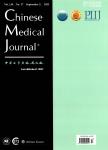Head-to-head comparison of the test performance of selfadministered qualitative vs. laboratory-based quantitative fecal immunochemical tests in detecting colorectal neoplasm
Head-to-head comparison of the test performance of self-administered qualitative vs. laboratory-based quantitative fecal immunochemical tests in detecting colorectal neoplasm作者机构:Office of Cancer ScreeningNational Cancer Center/National Clinical Research Center for Cancer/Cancer HospitalChinese Academy of Medical Sciences and Peking Union Medical CollegeBeijing 100021China Department of General SurgeryPeking Union Medical College HospitalChinese Academy of Medical Sciences and Peking Union Medical CollegeBeijing 100730China
出 版 物:《Chinese Medical Journal》 (中华医学杂志(英文版))
年 卷 期:2021年第134卷第11期
页 面:1335-1344页
核心收录:
学科分类:1002[医学-临床医学] 100214[医学-肿瘤学] 10[医学]
基 金:by grants from the Cancer Foundation of China the Beijing Nova Program of Science and Technology(No.Z191100001119065) the Natural Science Foundation of Beijing Municipality(No.7202169) the CAMS Innovation Fund for Medical Sciences(No.2017-I2M-1-006)
主 题:Fecal immunochemical test Test performance Colorectal neoplasm Screening
摘 要:Background:Fecal immunochemical tests(FITs)are the most widely used non-invasive tests in colorectal cancer(CRC)***,evidence about the direct comparison of the test performance of the self-administered qualitative a laboratory-based quantitative FITs in a CRC screening setting is ***:Based on a CRC screening trial(TARGET-C),we included 3144 pre-colonoscopy fecal samples,including 24 CRCs,230 advanced adenomas,622 non-advanced adenomas,and 2268 participants without significant findings at *** selfadministered qualitative FITs(Pupu tube)with positivity thresholds of 8.0,14.4,or 20.8 mg hemoglobin(Hb)/g preset by the manufacturer and one laboratory-based quantitative FIT(OC-Sensor)with a positivity threshold of 20 mg Hb/g recommended by the manufacturer were tested by trained staff in the central *** diagnostic performance of the FITs for detecting colorectal neoplasms was compared in the different scenarios using the preset and adjusted thresholds(for the quantitative FIT).Results:At the thresholds preset by the manufacturers,apart from the qualitative FIT-3,significantly higher sensitivities for detecting advanced adenoma were observed for the qualitative FIT-1(33.9%[95%CI:28.7–39.4%])and qualitative FIT-2(22.2%[95%CI:17.7–27.2%])compared to the quantitative FIT(11.7%[95%CI:8.4–15.8%]),while at a cost of significantly lower ***,such difference was not observed for detecting *** scenarios of adjusting the positivity thresholds of the quantitative FIT to yield comparable specificity or comparable positivity rate to the three qualitative FITs accordingly,there were no significant differences in terms of sensitivity,specificity,positive/negative predictive values and positive/negative likelihood ratios for detecting CRC or advanced adenoma between the two types of FITs,which was further evidenced in ROC ***:Although the self-administered qualitative and the laboratory-based quantitat



